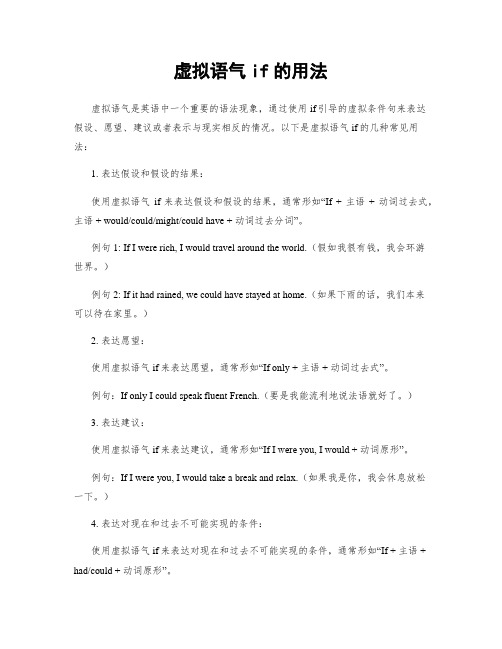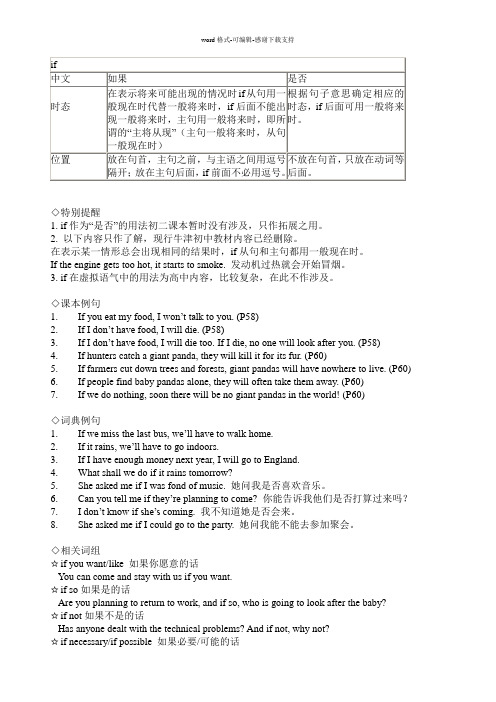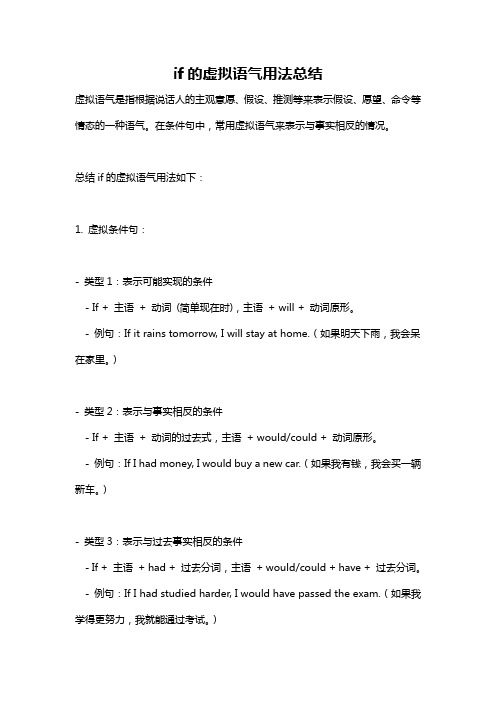if用法总结
英语中if的用法

1. (表示条件)如果,主句用将来时,if从句用现在时表示将来He will come if you invite him.如果你请他,他会来的。
2. (表示虚拟)假如,要是1)时态:可以表示过去,现在和将来的情况。
它的基本特点是时态退后。
a. 同现在事实相反的假设。
句型:条件从句主句一般过去时should( would) +动词原形If they were here, they would help you.b. 表示于过去事实相反的假设。
句型:条件从句主句过去完成时should(would) have+ 过去分词If she had worked harder, she would have succeeded.The rice would not have been burnt if you had been more careful. If my lawyer had been here last Saturday, he would have prevented me from going.If he had come yesterday, I should / would have told him about it. 含义:He did not come yesterday, so I did not tell him about it.If he had not been ill and missed many classes, he would have made greater progress.含义:He was ill and missed many lessons, so he did not make greater progress.c. 表示对将来的假想句型:条件从句主句一般过去时should+ 动词原形were+ 不定式would + 动词原形should+ 动词原形If you succeeded, everything would be all right.If you should succeed, everything would be all right.If you were to succeed, everything would be all right.3. 是否= whether 连接宾语从句I wonder if she is ill.不知她是否病了。
if句型的用法总结

if句型的用法总结1. if句型的基本用法if句型是英语中最常用的条件句句型之一,它用于描述一个条件成立时会发生什么样的结果。
基本的if句型结构为:if 条件:条件成立时执行的代码块在这个结构中,条件决定了是否执行代码块的部分。
如果条件成立,代码块将会被执行;如果条件不成立,则代码块将会被忽略。
2. if…else句型除了基本的if句型外,还有一个常见的变体——if…else句型。
它在条件成立时执行一个代码块,并在条件不成立时执行另一个代码块。
其结构如下:if 条件:条件成立时执行的代码块else:条件不成立时执行的代码块在if…else句型中,如果条件成立,将执行if代码块;否则,将执行else代码块。
3. if…elif…else句型在某些情况下,我们可能需要判断多个条件,并根据不同的条件执行不同的代码块。
这时,可以使用if…elif…else句型。
其结构如下:if 条件1:条件1成立时执行的代码块elif 条件2:条件2成立时执行的代码块elif 条件3:条件3成立时执行的代码块...else:条件都不成立时执行的代码块在if…elif…else句型中,只有当前面的条件不成立时才会判断后面的条件。
如果某个条件成立,将执行对应的代码块。
如果所有条件都不成立,将执行else代码块。
4. 嵌套if语句在某些情况下,我们可能需要在if代码块中再次使用if语句,这就是嵌套if语句。
嵌套if语句可以用于处理更复杂的条件判断。
例如:if 条件1:if 条件2:条件1和条件2同时成立时执行的代码块else:条件1成立,但条件2不成立时执行的代码块else:条件1不成立时执行的代码块在嵌套if语句中,内部的if语句只有在外部if语句的条件成立时才会被执行。
5. if语句的注意事项•条件表达式:–条件表达式应该是一个布尔表达式,即可以判断为真或假的表达式。
–可以使用比较运算符(如==、!=、<、>等)、逻辑运算符(如and、or等)以及其他返回布尔值的函数或表达式作为条件。
if的用法归纳总结

if的用法归纳总结if是英语中常用的一个连词,用于表达条件、假设或可能性。
它在句子中起到连接不同语义部分的作用,使得句子更加完整、清晰。
以下是对if的用法进行归纳总结:1. 表达现实条件:- if引导的主句表示现在或将来的真实条件,从句使用一般现在时态。
例:If it rains tomorrow, we will stay at home.- if引导的主句表示过去的真实条件,从句使用一般过去时态。
例:If she was tired yesterday, she went to bed early.2. 表达虚拟条件:- if引导的主句表示与事实相反的条件,从句使用过去完成时。
例:If I had studied harder, I would have passed the exam.- if引导的主句使用过去完成时,从句使用过去完成时进行的虚拟条件。
例:If he had arrived earlier, we would have caught the train.3. 表达将来可能性:- if引导的主句表示将来可能发生的条件,从句使用一般现在时态。
例:If it snows tomorrow, we will go skiing.4. 表达建议或要求:- if引导的主句表示建议或要求,从句使用一般现在时态。
例:If you have any questions, please ask.5. 表达假设:- if引导的主句表示假设,从句使用一般现在时态。
例:If I were you, I would apologize.6. 表达条件连词短语:- if引导的主句与从句之间有条件连词短语,从句使用一般现在时态。
例:If it is sunny tomorrow, we can go to the beach.7. 使用whether替代if:- 当表示是否的意思时,可以使用whether替代if。
if虚拟语气的用法归纳

if虚拟语气的用法归纳IF虚拟语气是英语中的一种重要语法现象,主要用于表示与现实相反的假设、愿望、建议等。
它分为两种形式:if条件句和if非条件句。
以下是对IF虚拟语气用法的详细介绍:一、if条件句1. 表示与现在事实相反的假设:If + 主语+ 过去时态,主语+ would/could/might/should + 动词原形。
例如:If I were you, I would go to the party.(如果我处在你的位置,我会去参加派对。
)2. 表示与过去事实相反的假设:If + 主语+ had done,主语+ would/could/might/should + have done。
例如:If he had come to the meeting, he would have known the plan.(如果他参加了会议,他就会知道这个计划。
)二、if非条件句1. 表示建议、劝告:主语+ should/would/might/ought to + 动词原形。
例如:You should go to the party.(你应该去参加派对。
)2. 表示愿望:主语+ could/would/might + 动词原形。
例如:I wish I were a bird.(我希望我是一只鸟。
)3. 表示假设:If + 主语+ 动词过去式,主语+ would/could/might + 动词原形。
例如:If I had time, I would go to the park.(如果我有时间,我会去公园。
)三、if虚拟语气的特殊结构1. 省略if,将were、had、should等词置于主语之前:主语+ were/had/should + 动词原形。
例如:She were here, she would meet him.(如果她在这里,她会见到他。
)2. 使用倒装结构:were/had/should + 主语+ 动词原形。
if 语句用法

if 语句用法
1. 嘿,你知道吗?if 语句就像是一个智能的小开关!比如说,“如果今天下雨,那就带上雨伞出门”。
这就像你在面对不同情况时有个机灵的决策机制一样。
2. 想想看呀,如果考试成绩达到 90 分以上,那就奖励自己一个小礼物。
这if 语句不就是帮我们决定怎么做的好帮手吗?
3. 哇塞,如果明天气温降到零度以下,那就得穿厚棉袄啦!这多形象啊,if 语句就是这么神奇,根据不同条件引导我们的行动呢。
4. 哎呀,如果朋友来家里玩,当然要好好准备一顿大餐喽!它是不是特别像一个贴心的引导员呀。
5. 咦,如果上班路上堵车,那是不是得换条路走呀?if 语句让我们能灵活应对各种状况呀。
6. 你瞧,如果身体不舒服,就得赶紧去看医生呀!这不就体现了 if 语句的重要性嘛。
我觉得 if 语句真的太有用啦,就像我们生活中的智慧小精灵,让我们能根据不同情况做出最合适的选择!。
if的两种意思及用法

if的两种意思及用法
"if" 这个词有两种主要的意思和用法:
1. 条件连词:在这种情况下,"if" 被用来引导一个条件从句,表达假设、条件或可能性。
例如:
- If it rains, we will stay at home.(如果下雨,我们会呆在家里。
)
- I will go to the party if I finish my work on time.(如果我能按时完成工作,我会去参加聚会。
)
2. 当,假如:在这种情况下,"if" 被用来表示假设或推测。
通常用于虚拟语气的句子中。
例如:
- If I were you, I would apologize.(如果我是你,我会道歉。
)
- If she had studied harder, she would have passed the exam.(如果她学习更努力,她就会通过考试。
)
在这两种用法中,"if" 都用于表达条件、假设或可能性。
根据上下文,可以确定它的具体含义和用法。
英语中if的用法

1. (表示条件)如果,主句用将来时,if从句用现在时表示将来He will come if you invite him.如果你请他,他会来的。
2. (表示虚拟)假如,要是1)时态:可以表示过去,现在和将来的情况。
它的基本特点是时态退后。
a. 同现在事实相反的假设。
句型:主句should( would) +If they were here, they would help you.b. 表示于过去事实相反的假设。
句型:主句should(would) have+ 过去分词If she had worked harder, she would have succeeded.The rice would not have been burnt if you had been more careful.If my lawyer had been here last Saturday, he would have prevented me from going.If he had come , I should / would have told him about it.含义:He did not come , so I did not tell him about it.If he had not been ill and missed many classes, he would have made greater progress. 含义:He was ill and missed many lessons, so he did not make greater progress.c. 表示对将来的假想句型:主句should+were+ would +should+ 动词原形If you succeeded, everything would be all right.If you should succeed, everything would be all right.If you were to succeed, everything would be all right.3. 是否= whether 连接I wonder if she is ill.不知她是否病了。
IF的用法

IF的用法if是英语中出现频率很高的连词,并且它的用法也很多。
学生感到很难掌握,为了让同学们更多更好地了解其用法及其语法功能。
现结合教学中遇到的情况,予以归纳,以供参考。
一、if作为连词,引导条件状语从句,它表示的意思是“假如”“如果”等。
在复合句中如果主句用将来时,则if引导的状语从句用一般现在时。
例如:1. If itdoesn’train, we will go to the park next Sunday. 如果天不下雨,下周星期天我们将去公园。
2. If you ask him,he will help you.如果你求他,他将会帮助你。
二、if还可以引导让步状语从句。
这时if当作“即使是”,“虽说”解。
例如:1. If she’s poor,at least she’s honest.虽说她很穷,但至少她还是诚实的。
2. If I am wrong,you are wrong,too.即使说我错了,那么你也不对。
3. I’ll do it, even if it takes me all the afternoon.虽然会花费我一下午的时间,我还是要做这事。
三、if作为连词还可以引导宾语从句。
引导宾语从句时和whether意思相同。
例如:1. Lily asked if /whether she liked it. 莉莉问她是否喜欢它。
2. She asked if /whether they had a cotton one.她问是否他们有一件棉织的。
四、if引导时间状语从句,当if做“当”或“无论何时”解而不含有条件之义时,if从句中的时态与主句中的时态相同。
例如:1. If youmix yellow and blue,you get green.你将黄色与蓝色混合,便会得到绿色。
2. If she wants the servant,she rings the bell.每当她需要仆人时,她便按铃。
if作为如果的用法

if作为如果的用法"If" 是英语中的一个条件连词,表示“如果”、“假设”或“倘若”等意思。
它主要用于引导条件状语从句,表示某个条件成立时,主句的动作或状态就会发生。
以下是"if" 的一些基本用法:1. 基本形式:if + 条件状语从句,主句。
例如:- If it rains tomorrow, I will take an umbrella.(如果明天下雨,我会带伞。
)- If I have time, I will go to the movie with you.(如果我有时间,我会和你一起去看电影。
)2. 否定形式:if + 条件状语从句,主句+ not。
例如:- If he doesn't study hard, he won't pass the exam.(如果他不努力学习,他就不能通过考试。
)3. 疑问形式:if + 条件状语从句,主句+ 吗?例如:- If she likes dancing, does she go to the dance class?(如果她喜欢跳舞,她去上舞蹈课吗?)4. 短语搭配:- if only:表示对过去事物的愿望或遗憾,意为“要是……就好了”。
例如:- If only I had known about the party earlier.(要是早点知道这个派对就好了。
)- unless:表示除非某个条件成立,否则会发生某个结果。
例如:- Unless you hurry up, you'll be late for the train.(除非你快点,否则你会错过火车。
)- in case:表示以防万一,用于引导目的状语从句。
例如:- Bring an umbrella in case it rains.(以防下雨,带上伞。
)- on condition that:表示在某个条件成立的情况下,才会发生某个动作或状态。
虚拟语气if的用法

虚拟语气if的用法虚拟语气是英语中一个重要的语法现象,通过使用if引导的虚拟条件句来表达假设、愿望、建议或者表示与现实相反的情况。
以下是虚拟语气if的几种常见用法:1. 表达假设和假设的结果:使用虚拟语气if来表达假设和假设的结果,通常形如“If + 主语+ 动词过去式,主语 + would/could/might/could have + 动词过去分词”。
例句1: If I were rich, I would travel around the world.(假如我很有钱,我会环游世界。
)例句2: If it had rained, we could have stayed at home.(如果下雨的话,我们本来可以待在家里。
)2. 表达愿望:使用虚拟语气if来表达愿望,通常形如“If only + 主语 + 动词过去式”。
例句:If only I could speak fluent French.(要是我能流利地说法语就好了。
)3. 表达建议:使用虚拟语气if来表达建议,通常形如“If I were you, I would + 动词原形”。
例句:If I were you, I would take a break and relax.(如果我是你,我会休息放松一下。
)4. 表达对现在和过去不可能实现的条件:使用虚拟语气if来表达对现在和过去不可能实现的条件,通常形如“If + 主语 + had/could + 动词原形”。
例句1: If I had wings, I could fly in the sky.(如果我有翅膀,我就能在天空中飞翔。
)例句2: If I could play the piano, I would perform at the concert.(如果我会弹钢琴,我将会在音乐会上表演。
)总结起来,虚拟语气if的用法包括表达假设和假设的结果、愿望、建议以及对现在和过去不可能实现的条件。
if的用法总结

if的用法总结if的用法总结:if表示条件,意思是如果;if表示虚拟,意思是假如;if表示是否的含义,和whether相同用法,连接宾语从句。
扩展资料1.(表示条件)如果 ,主句用将来时,if从句用现在时表示将来He will come if you invite him.如果你请他,他会来的.2.(表示虚拟)假如,要是时态:可以表示过去,现在和将来的`情况.它的基本特点是时态退后.a.同现在事实相反的假设.句型:条件从句主句一般过去时 should( would) +动词原形If they were here,they would help you.b.表示于过去事实相反的假设.句型:条件从句主句过去完成时 should(would) have+ 过去分词If she had worked harder,she would have succeeded.The rice would not have been burnt if you had been more careful.If my lawyer had been here last Saturday,he would have prevented me from going.If he had come yesterday,I should / would have told him about it.含义:He did not come yesterday,so I did not tell him about it.If he had not been ill and missed many classes,he would have made greater progress.含义:He was ill and missed many lessons,so he did not make greater progress.c.表示对将来的假想句型:条件从句主句一般过去时 should+ 动词原形were+ 不定式 would + 动词原形should+ 动词原形If you succeeded,everything would be all right.If you should succeed,everything would be all right.If you were to succeed,everything would be all right.3.是否 = whether 连接宾语从句I wonder if she is ill.不知她是否病了.。
英语中if的用法

1. (表示条件)如果,主句用将来时,if从句用现在时表示将来He will come if you invite him.如果你请他,他会来的。
2. (表示虚拟)假如,要是1)时态:可以表示过去,现在和将来的情况。
它的基本特点是时态退后。
a. 同现在事实相反的假设。
句型:条件从句主句一般过去时should( would) +动词原形If they were here, they would help you.b. 表示于过去事实相反的假设。
句型:条件从句主句过去完成时should(would) have+ 过去分词If she had worked harder, she would have succeeded.The rice would not have been burnt if you had been more careful.If my lawyer had been here last Saturday, he would have prevented me from going.If he had come yesterday, I should / would have told him about it.含义:He did not come yesterday, so I did not tell him about it.If he had not been ill and missed many classes, he would have made greater progress. 含义:He was ill and missed many lessons, so he did not make greater progress.c. 表示对将来的假想句型:条件从句主句一般过去时should+ 动词原形were+ 不定式would + 动词原形should+ 动词原形If you succeeded, everything would be all right.If you should succeed, everything would be all right.If you were to succeed, everything would be all right.3. 是否= whether 连接宾语从句I wonder if she is ill.不知她是否病了。
if用法归纳

◇特别提醒1. if作为“是否”的用法初二课本暂时没有涉及,只作拓展之用。
2. 以下内容只作了解,现行牛津初中教材内容已经删除。
在表示某一情形总会出现相同的结果时,if从句和主句都用一般现在时。
If the engine gets too hot, it starts to smoke. 发动机过热就会开始冒烟。
3. if在虚拟语气中的用法为高中内容,比较复杂,在此不作涉及。
◇课本例句1. If you eat my food, I won’t talk to you. (P58)2. If I don’t have food, I will die. (P58)3. I f I don’t have food, I will die too. If I die, no one will look after you. (P58)4. If hunters catch a giant panda, they will kill it for its fur. (P60)5. If farmers cut down trees and forests, giant pandas will have nowhere to live. (P60)6. If people find baby pandas alone, they will often take them away. (P60)7. If we do nothing, soon there will be no giant pandas in the world! (P60)◇词典例句1. If we miss the last bus, we’ll have to walk home.2. If it rains, we’ll h ave to go indoors.3. If I have enough money next year, I will go to England.4. What shall we do if it rains tomorrow?5. She asked me if I was fond of music. 她问我是否喜欢音乐。
if的用法虚拟语气

if的用法虚拟语气一、概述使用虚拟语气的一个重要方面是if条件句。
在英语中,if引导的条件句可以表达对现实情况的假设、猜测以及对未来可能发生情况的虚构和愿望。
本文将介绍if 条件句的三种形式以及它们在不同语境中的用法。
二、Type 1 条件句:对现实情况的假设Type 1 条件句表示真实或可能发生的事实,并使用“现在时”来描述。
这种条件句引导下,主句可以使用一般现在时或将来时。
1. If + 简单现在时,主句一般现在时如果明天下雨,我会带伞。
If it rains tomorrow, I will take an umbrella.2. 如果明天下雨,我就不去野餐。
If it rains tomorrow, I won't go on a picnic.3. 如果你迟到,老板会生气。
If you are late, the boss gets angry.4. 如果他学习努力,他可以通过考试。
If he studies hard, he can pass the exam.三、Type 2 条件句:对现在虚拟情况及假设提出建议或警告Type 2 条件句用于描述目前不太可能或不太可能发生事实,并使用“过去时”来描述。
这种条件句引导下,主句使用虚拟语气来表达对未来情况的假设。
1. 如果我有更多时间,我会旅行。
If I had more time, I would travel.2. 如果她付出更多努力,她会取得好成绩。
If she worked harder, she would get better grades.3. 如果你离开公司,你将失去机会。
If you leave the company, you will miss the opportunity.4. 如果我是你,我会接受那份工作。
If I were you, I would take that job.四、Type 3 条件句:对过去虚拟情况及假设提出后悔或反悔Type 3 条件句用于描述过去不可能发生的事实,并使用“过去完成时”来描述。
if的虚拟语气用法总结

if的虚拟语气用法总结虚拟语气是指根据说话人的主观意愿、假设、推测等来表示假设、愿望、命令等情态的一种语气。
在条件句中,常用虚拟语气来表示与事实相反的情况。
总结if的虚拟语气用法如下:1. 虚拟条件句:- 类型1:表示可能实现的条件- If + 主语+ 动词(简单现在时),主语+ will + 动词原形。
- 例句:If it rains tomorrow, I will stay at home.(如果明天下雨,我会呆在家里。
)- 类型2:表示与事实相反的条件- If + 主语+ 动词的过去式,主语+ would/could + 动词原形。
- 例句:If I had money, I would buy a new car.(如果我有钱,我会买一辆新车。
)- 类型3:表示与过去事实相反的条件- If + 主语+ had + 过去分词,主语+ would/could + have + 过去分词。
- 例句:If I had studied harder, I would have passed the exam.(如果我学得更努力,我就能通过考试。
)2. 虚拟表达愿望:- 类型1:表示对现在或将来的愿望- 希望、愿望等动词+ (that) + 主语+ (should) + 动词原形。
- 例句:I wish (that) I could speak fluent English.(我希望我能说一口流利的英语。
)- 类型2:表示对过去的愿望- 希望、愿望等动词+ (that) + 主语+ (should) + have + 过去分词。
- 例句:I wish (that) I had studied abroad when I was younger.(我希望我年轻时出国留学了。
)3. 虚拟表达建议、命令等:- 动词原形+ (that) + 主语+ (should) + 动词原形。
- 例句:I suggest (that) you should take a break.(我建议你应该休息一下。
if的用法归纳总结

if的用法归纳总结一、if的基本用法if是一个常见的条件语句,用于判断某个条件是否成立。
在程序设计中,if语句可以根据条件的真假执行不同的代码块。
1.1 单个if语句最简单的if语句由关键词"if"和一个布尔表达式组成。
如果布尔表达式的值为True,那么紧随其后缩进的代码块将会被执行;如果布尔表达式的值为False,则跳过这个代码块。
示例:```num = 10if num > 0:print("数值大于0")```1.2 if-else语句在某些情况下,我们可能需要根据条件选择执行不同的代码块。
这时可以使用if-else语句。
当条件为True时,执行if块内的代码;当条件为False时,执行else 块内的代码。
示例:```num = -5if num > 0:print("数值大于0")else:print("数值小于等于0")```1.3 if-elif-else语句在多个条件需要进行判断时,可以使用多个elif来衔接不同的判断分支。
elif 是"else if"的缩写形式。
只有当之前所有条件都为False时,才会执行最后一个else 块中的代码。
示例:```score = 85if score >= 90:print("优秀")elif score >= 80:print("良好")elif score >= 70:print("中等")elif score >= 60:print("及格")else:print("不及格")```二、if的高级用法if语句不仅可以判断条件,还可以与其他操作符一起使用,实现更加复杂的逻辑。
2.1 嵌套if语句嵌套if语句允许在一个if或else块中包含另一个if语句。
if表示即使的用法

if表示即使的用法if 表示即使的用法什么是 if 表示即使的用法在英语中,“if”这个词除了表示“如果”的意思外,还可以表示“即使”的意思。
这种用法在表达一个条件已成事实的情况时十分常见。
接下来,我们将详细介绍 if 表示即使的用法,帮助您更好地理解和运用。
用法一:表示现实情况使用 if 表示即使时,我们可以表达某个条件是已知的、已经存在的情况:•例句 1: If it is raining, I will bring an umbrella.(即使下雨,我会带上伞。
)•例句 2: If I am tired, I will take a nap. (即使我累了,我会小睡一会儿。
)以上两个例句中,“if”后面的条件是已经存在的,不管是否会发生,我们都会采取相应的行动。
用法二:表示个人喜好或反对if 表示即使还可以表达个人的喜好或反对,用于描述无论条件如何,个人的态度和决定是不变的。
•例句 1: I would go to the party if they played my favorite music. (即使他们播放我的最爱音乐,我也会去参加派对。
)•例句 2: He wo uldn’t buy the car even if it was on sale.(即使这辆车打折出售,他也不会买。
)这两个例句中,“if”后面的条件并不是真实的,只是用来强调个人的喜好或决定。
用法三:表示不可能实现的情况if 表示即使还可以用来表达一种不可能实现的情况,用于形容一种无法改变的现有状况。
•例句 1: If I were a bird, I would fly everywhere. (即使我是一只鸟,我会到处飞。
)•例句 2: If I had a million dollars, I would travel the world. (即使我有一百万美元,我会周游世界。
)在这两个例句中,“if”后面的条件并不是现实中可以实现的,用来表达作者内心的渴望或假设。
英语中if的用法

英语中i f的用法 Ting Bao was revised on January 6, 200211.(表示条件)如果,主句用将来时,if从句用现在时表示将来Hewillcomeifyouinvitehim.如果你请他,他会来的。
2.(表示虚拟)假如,要是1)时态:可以表示过去,现在和将来的情况。
它的基本特点是时态退后。
a.同现在事实相反的假设。
句型:主句should(would)+Iftheywerehere,theywouldhelpyou.b.表示于过去事实相反的假设。
句型:主句should(would)have+过去分词Ifshehadworkedharder,shewouldhavesucceeded. Thericewouldnothavebeenburntifyouhadbeenmorecareful.IfmylawyerhadbeenherelastSaturday,hewouldhavepreventedmefromgoing.Ifhehadcome,Ishould/wouldhavetoldhimaboutit.含义:Hedidnotcome,soIdidnottellhimaboutit. Ifhehadnotbeenillandmissedmanyclasses,hewouldhavemadegreaterprogress. 含义:Hewasillandmissedmanylessons,sohedidnotmakegreaterprogress.c.表示对将来的假想句型:主句should+were+would+should+动词原形Ifyousucceeded,everythingwouldbeallright.Ifyoushouldsucceed,everythingwouldbeallright.Ifyouweretosucceed,everythingwouldbeallright.3.是否=whether连接Iwonderifsheisill.不知她是否病了。
- 1、下载文档前请自行甄别文档内容的完整性,平台不提供额外的编辑、内容补充、找答案等附加服务。
- 2、"仅部分预览"的文档,不可在线预览部分如存在完整性等问题,可反馈申请退款(可完整预览的文档不适用该条件!)。
- 3、如文档侵犯您的权益,请联系客服反馈,我们会尽快为您处理(人工客服工作时间:9:00-18:30)。
虚拟过去式有时并不表示“不大可能实现的假设”,而是表示一种希望或不希望发生的动作。
如:
If we caught the early train, wed get there by lunch time.
假如我们赶上早班火车,到午饭时间我们就会到达那里了。(表希望)
1. 与现在事实相反的虚拟条件句,条件从句的谓语用动词的过去式 (be的过去式用were), 主句的谓语用should (would, might, could)+动词原形。
如:
If it were not raining, we should go for a picnic.如果现在不下雨的话,我们就出去野餐了。
Had you not helped me, I should have failed.要是没有你的帮助,我就失败了。
Were you in my position, you would do the same. 假如你处在我的地位,你也会这样干的。
Should they attack us, well wipe them out completely.
虚拟语气(subjunctive mood),表示说的话不是事实,或者是不可能发生的情况,而是一种愿望、建议或与事实相反的假设等。
一. 虚拟语气在条件句中的应用
学习虚拟语气在条件句中的用法之前我们必须清楚条件句的种类:条件句有真实条件句与非真实条件句(或称虚拟条件句)两种。真实条件句所表的假设是可能发生或实现的,句中的条件从句与结果主句都用陈述语气。
如:
She would have gone to the party if she had been invited.
要是当初她被邀请的话,她就会去参加这次聚会了。
(事实是:当时没有人邀请她,因此,她没有来参加聚会。表示后悔。)
If she hadnt called me, I would have overslept this morning.
今天早上,她要是不叫我的话,我就会睡过头了。
(事实是:她今天早上叫我了,我没有睡过头。表示感激。)
3. 与将来事实可能相反的虚拟条件句,条件从句的谓语用动词的过去式(be的过去式用were); should+动词原形;were to+动词原形,主句用should (would, might, could)+动词原形。
如果没有你的帮助,我们的实验是不会成功的。(暗含在分词短词but for your help)
What would I have done without you? 如没有你,我会怎么办呢?(条件暗含在介词短语wiБайду номын сангаасhout you 中)
It would be easier to do it this way. 这样做会比较容易。
2) 条件暗含在上下文中。
如:
You might stay here forever. 你可以永远待在这儿。(可能暗含if you wanted to)
We would have succeeded. 我们本来是会成功的。(可能暗含if we had kept trying)
Susan is walking slowly ,as if she were tired. 苏珊走得很慢,就像是累了似的。
与if一样,上述词语所引导的条件从句亦可用陈述语气,表可能实现或发生的事。
虚拟语气除主要用于条件句(也就是状语从句)外,还可用于主语从句、宾语从句、表语从句、定语从句等。
要是这样的话,会怎么样呢?
He can use the bicycle on condition that he should return it tomorrow.
如果明天能还回来,他就可以借用这辆自行车。
In case I forget , please remind me of my promise 如果我忘了,请提醒我的诺言。
He would pass the test if he had taken my advice.如果他听了我的劝告,他现在会通过考试。
If I had spoken to him yesterday, I should know what to do now.
假如昨天我对他说了,现在我就知道该怎么办了。
1. 虚拟语气在主语从句中的应用
“常用在It is (was)+形容词 / 过去分词+that引导的主语从句”的句型中的主语从句要用虚拟语气。主语从句的谓语用should+动词原形(或should+have+过去分词)或只用动词原形(尤其是美国英语)。should在此是助动词,本身并无实义,这种主语从句中的should有时有感情色彩。
If we missed the train, we should have to wait an hour at the station.
假如我们赶不上这班火车,我们就得在车站等一小时。(表不希望)
4. 混合型的条件句
当条件从句与主句所表的时间不一致时,虚拟语气的形式应作相应的调整。主句和从句的谓语动词并不相互呼应,这种条件句叫混合条件句。较多见的混合型条件句是从句用过去完成时(指过去行为),而主句用一般时(指目前状态)。
求虚拟语气的全面总结
虚拟语气
语气 (mood)是一种动词形式,用以表示说话者的意图或态度。英语中的语气有三种:陈述语气、祈使语气和虚拟语气。
直陈语气(indicative mood),表示所说的话是事实。
祈使语气 (imperative mood),表示所说的话是请求或命令。
Your reputation would be ruined. 你的名誉会败坏的。(可能暗含 if you should accept it)
3) 在不少情况下,虚拟式已变成习惯说法,很难找出其暗含的条件。
如:
You wouldnt know. 你不会知道。
I would like to come. 我愿意来。
如:
If it doesnt rain tomorrow, I will go for a picnic. 假若明天不下雨,我就去野餐。
Oil floats if you pour it on water. 你如把油倒在水里,油就浮起来。
虚拟条件句所表的假设则是不可能或不大可能发生或实现的,句中的条件从句与结果主句皆须用虚拟语气。 条件从句主句与现在事实相反
You would be much better now if you had taken my advice.
假如你接受了我的意见,你现在就会好得多。
如条件从句用if I were...,主句则可用表任何时间的虚拟形式。
如:
If I were not busy, I would have come.
四. 不用if引导的条件从句
虚拟条件句中的条件从句除用if引外,还可用when, unless, lest, suppose, as if, for fear, in case, on condition 等词语来引导。
如:
The peasants prepared to feed the city when it should be freed.
(条件暗含在不定式短语 to do it this way中)
This same thing, happening in wartime, amount to disaster.
同样的事,如发生在战时,就会酿成大祸。(条件暗含在分词短语happening in wartime 中)
He must have the strength of a hippopotamus, or he never could have vanquished that great beast. 他一定是力大如河马,否则他绝不会击败那只庞大的野兽。(暗含条件是连词or)
Alone, he would have been terrified. 如是单独一人,他是会感到害怕的。(暗含条件是alone)
(事实是:天在下雨,我们不能出去野餐。表示愿望。)
If he came here, he might be able to help you. 如果他来这,他就能够帮助你了。
(事实是:他没来这,他不可能帮助你。表示对他的良好印象。)
2. 与过去事实相反的虚拟条件句,条件从句的谓语用had+过去分词,主句的谓语用should ( would, might, could)+ have +过去分词。
If 主语 +动词过去式(be的过去式用were)should (would, might, could)+动词原形 与过去事实相反
If 主语 +had+过去分词should ( would, might, could)+ have +过去分词 与将来事实可能相反
If 主语 +动词过去式(be的过去式用were); should+动词原形;were to+动词原形should (would, might, could)+动词原形
Suppose you were given a chance to study in America, would you accept?
假如给你一个到美国学习的机会,你会接受吗?(suppose 或 supposing =what if)
Supposing it were so?(=Supposing it were so,what would happen?)
